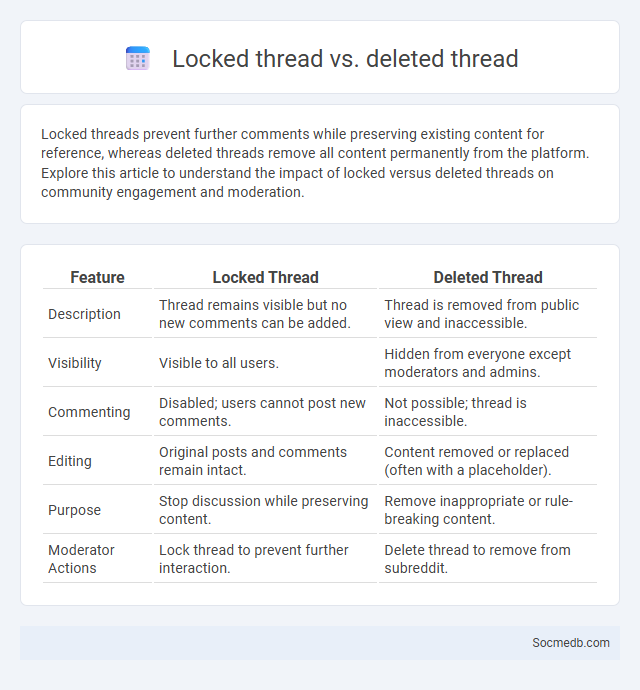
Photo illustration: Locked thread vs Deleted thread
Locked threads prevent further comments while preserving existing content for reference, whereas deleted threads remove all content permanently from the platform. Explore this article to understand the impact of locked versus deleted threads on community engagement and moderation.
Table of Comparison
| Feature | Locked Thread | Deleted Thread |
|---|---|---|
| Description | Thread remains visible but no new comments can be added. | Thread is removed from public view and inaccessible. |
| Visibility | Visible to all users. | Hidden from everyone except moderators and admins. |
| Commenting | Disabled; users cannot post new comments. | Not possible; thread is inaccessible. |
| Editing | Original posts and comments remain intact. | Content removed or replaced (often with a placeholder). |
| Purpose | Stop discussion while preserving content. | Remove inappropriate or rule-breaking content. |
| Moderator Actions | Lock thread to prevent further interaction. | Delete thread to remove from subreddit. |
Introduction: Understanding Forum Moderation Actions
Forum moderation actions are essential for maintaining respectful and constructive online communities by enforcing rules and guidelines. These actions include content removal, user warnings, temporary suspensions, and permanent bans to address violations and prevent toxic behavior. Understanding how moderators implement these measures helps you engage responsibly and contribute positively to social media platforms.
What is a Locked Thread?
A locked thread on social media is a conversation or post that has been restricted by moderators or group admins to prevent further comments or interactions. This feature helps maintain order by stopping spam, off-topic discussions, or heated arguments in communities. If you encounter a locked thread, your ability to contribute is paused to ensure the conversation remains controlled and focused.
What is a Deleted Thread?
A deleted thread on social media refers to a conversation or series of posts that have been permanently removed by the user or platform, making the content inaccessible to others. Your previous comments, replies, and shared information within that thread are no longer visible, which impacts engagement and information retrieval. Understanding the implications of deleted threads helps you manage your digital footprint and maintain privacy on social platforms.
Common Reasons for Locking Threads
Social media threads are often locked due to violations of community guidelines, such as hate speech, harassment, or spreading misinformation. Platforms prioritize user safety by restricting further comments to prevent escalation of conflicts or the spread of harmful content. You can maintain a healthy online presence by adhering to these guidelines and understanding the common reasons for thread lockdowns.
Common Reasons for Deleting Threads
Common reasons for deleting social media threads include protecting personal privacy, removing outdated or inaccurate information, and avoiding potential conflicts or misunderstandings. Many users delete threads to control their online reputation and prevent sensitive data from being misused. By managing your digital footprint thoughtfully, you maintain a safer and more positive presence across platforms.
Key Differences: Locked vs Deleted Threads
Locked threads on social media prevent further comments while preserving existing content for user reference, ensuring ongoing visibility without interaction. Deleted threads are entirely removed from the platform, erasing all associated posts and comments, which impacts your digital footprint and content accessibility. Choosing between locking or deleting threads depends on managing engagement versus controlling information permanence.
Pros and Cons of Locking Threads
Locking threads on social media can enhance community management by preventing spam, off-topic posts, and heated arguments, thereby maintaining a focused and respectful environment. However, this action may frustrate users by limiting their ability to participate in ongoing discussions, potentially reducing engagement and user satisfaction. Understanding the balance between moderation and user interaction is crucial for optimizing your social media strategy.
Pros and Cons of Deleting Threads
Deleting threads on social media can improve privacy by removing sensitive information and reducing digital footprints, thereby protecting personal data from unauthorized access. However, it may also disrupt ongoing conversations, leading to loss of valuable context and historical interactions that could be important for reference or accountability. Balancing privacy concerns with community engagement is essential when deciding to delete threads.
Impacts on Community Engagement
Social media significantly enhances community engagement by enabling real-time communication and collaboration among diverse groups. Your ability to share ideas, organize events, and mobilize support is amplified through platforms like Facebook, Twitter, and Instagram, creating stronger connections within local and global communities. This digital interaction fosters increased participation, awareness, and collective action around social, cultural, and civic initiatives.
Best Practices for Moderators
Effective social media moderators employ clear community guidelines to foster respectful interactions, promptly address violations, and maintain an inclusive environment. Utilizing AI-powered tools enhances the detection of harmful content and streamlines moderation workflows. Consistent communication and feedback loops with users help build trust and sustain engagement.
 socmedb.com
socmedb.com